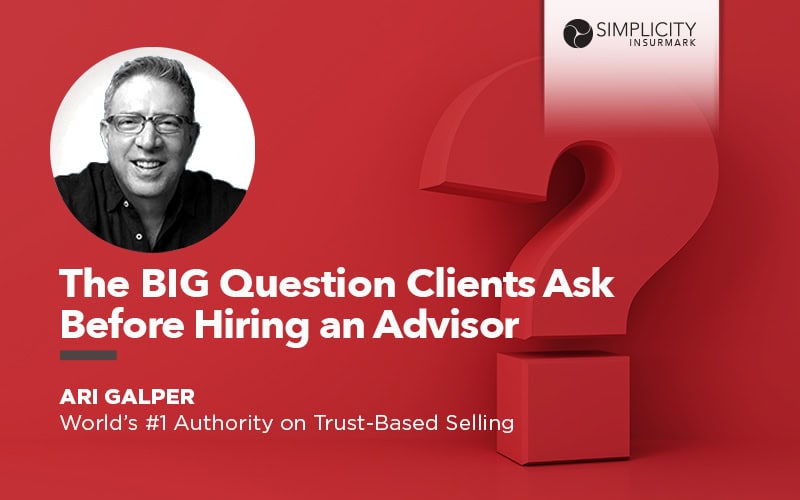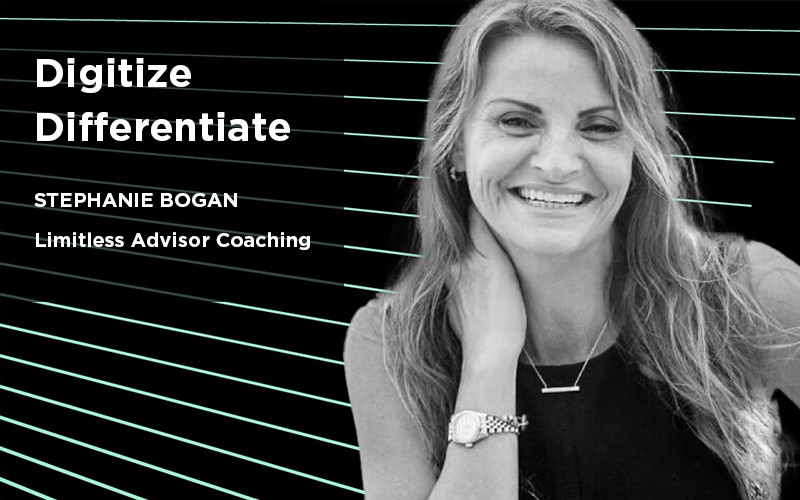There’s one question clients ask themselves before hiring a financial advisor. And this question is a biggie because it’s one of those make-or-break questions that involves something non-negotiable to clients. The question is: “Can I trust you?” It isn’t about the solutions you offer or even the problems you can solve. Advisors who can get to a “Yes!” pronto can grow and scale faster, but the same old mindset and sales approach doesn’t work anymore.
Key takeaways:
- Advisory services have become a commodity.
- The business of being an advisor and what matters to clients has changed.
- Advisors can differentiate themselves by being the advisor clients can trust.
- Financial advisors should think of themselves as financial doctors instead of salespeople.
- To build trust, advisors need to dig deep into the “cost of inaction” with clients.
Advisory services have become a commodity. Trust can be the differentiator.
The importance of trust in the advisor-client relationship was the topic of the day when Ari Galper, a renowned authority in trust-based selling, joined Virtual CMO Jack Martin on a recent episode of The Breakthrough Advisor podcast. The two discussed how the role of advisory firms has changed and why some firms are growing, while others are not.
What has changed in the financial advisory landscape?
We all know that client needs, technology, artificial intelligence (AI) and regulations will continue to evolve at a rapid-fire pace. But the business of being a financial advisor and what matters to clients have changed for a reason advisors tend to overlook.
As Galper explains, “We are now in an economy where advisors have been commoditized. Clients see all of ‘you guys or gals’ the same way. They can’t distinguish between this advisor and that advisor. The question they have in the back of their minds when hiring you is: ‘Do I trust you?’ NOT, can you solve my problem. They assume you can.”
How can financial advisors differentiate themselves?
Focus on trust skills not your value proposition. Clients don’t want to hear about how great you are or what value you offer. They’re out shopping advisors, assuming they’re comparing apples to apples, and they’re going to hire the advisor who “gets them.”
“Investment advice is easy to get. What used to be the exclusive domain of an advisor is now available in a lot of places. DIY, digital, annuities, life insurance information—it’s all easy to access. Today, being a trusted advisor is the point of differentiation that opens the door,” says Martin.
Adds Galper, “Yes. Your approach is different, not what you do. That’s the real mindset shift. The reality is clients are judging advisors on their approach. The approach itself becomes the differentiator, not the value proposition, which is so counterintuitive to what we’ve been taught to do all these years.”
The advisor’s role has shifted from salesperson to financial doctor.
Times have changed. Most financial advisors, especially those of us who have been doing this for a while, have a sales mindset. We want to do the talking. We want to sell. But according to Martin, “What we’ve learned is we’re not sellers anymore. We’re solvers. We can’t offer the same solution to everyone because each person has their own set of needs.”
This shift from seller to solver, means advisors need to wear a different hat now.
How has the role of a financial advisor changed?
As Galper explains, “There’s a real shift that has to happen here from salesperson to doctor, meaning you’re not a financial advisor anymore, you’re a financial doctor. Your job is to diagnose, identify the problem and amplify the issue. Once they understand the gravity of it, you have to ask the question, ‘Is this issue a priority for you to address and resolve once and for all?’
“They have to own the problem and say, ‘Can you help me?’ before you have permission to talk about anything related to you or a solution. This is so counterintuitive because we’re taught to engage, build a relationship, create momentum, move them forward. Forward is the problem because they believe you’re trying to sell and put pressure on them.”
To build trust, advisors need be crystal clear about the cost of inaction (COI).
You may be wondering how you can convince clients to own their problems and why this cements trust. Galper encourages advisors to focus on peeling back the layers of the client’s issues and goals for retirement, then present what the future will look like if they don’t act now to protect their financial resources.
What is the cost of inaction (COI) in financial services?
The phrase cost of inaction refers the actual cost the client will incur by not taking action to address their financial concerns. For example, many clients worry about running out of money and living a comfortable lifestyle in retirement. It’s the advisors’ job to help them understand the seriousness of their situation, the context of it and what it will actually cost NOT to fix their problem.
“You do this by using phrases like, have you considered, are you aware of, have you thought about things like … what it’s costing you every month to overpay your taxes to the government? Have you calculated what it will cost you to continue to fund your retirement, but possibly run out of money 30 years from now? Have you thought about that? Well, the answer’s going to be, no, because it’s your job to help them think about it, but you have to help them understand the gravity of their situation,” Galper says.
Once the client has clarity about the gravity of their situation, that’s when trust starts to solidify. They see you as the expert who “gets them” because you broke everything down based on their specific fears and needs. You’ve gained their trust and their business.
Want to learn more about trust-based selling?
You’ll definitely want to check out the podcast in its entirety. Ari Galper also wrote a book on the topic and he’ll mail it to you for free, just visit his Trust Book website for details. And if you want to learn how Simplicty InsurMark can help ambitious advisors build more sustainable and successful 21st century businesses, schedule a discovery call today.
As an ADO – Advisor Development Organization™, Simplicity InsurMark provides solutions to meet the ever-evolving needs of financial professionals with a mission to protect and enhance the financial security of every home in America.



